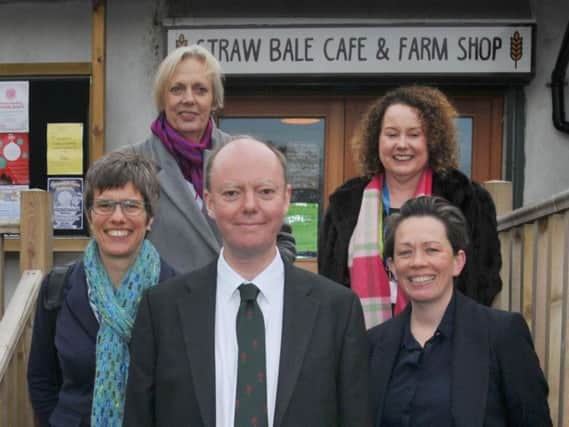Alcohol abuse support scheme to be extended after successful start


More than 30 “alcohol health champions” have been supporting people across the borough, encouraging them to rethink their drinking habits.
It is part of a scheme led by the University of Salford, named Greater Manchester’s Communities in Charge of Alcohol (CICA) programme, which aims to give communities the resources and skills to take control of their alcohol consumption.
Advertisement
Hide AdAdvertisement
Hide AdProf Chris Whitty, chief scientific adviser for the Department of Health and Social Care, visited Wigan last year to find out more about the work being done.
Now, council chiefs have revealed that the scheme is making such a difference in Wigan that more volunteers will be recruited.
Prof Kate Ardern, director of public health at Wigan Council, said: “Since we launched the Communities in Charge of Alcohol initiative locally in 2018, we have engaged with communities across the borough and have recruited more than 30 champions, who encourage people to talk about alcohol and support them to change their relationship with it.
“We’re proud to say that our initial target of recruiting 30 champions who live or work in the borough has been exceeded and therefore we would like to thank the public for volunteering their time and embracing this fantastic initiative.
Advertisement
Hide AdAdvertisement
Hide Ad“We have ambitions to increase the number of champions in the borough even further and are working closely with communities and providers to deliver our next set of training sessions.
“In line with The Deal, we’re committed to having different conversations with residents to ensure services are delivered in a way that is suited to their needs. By working in this way, we are able to deliver effective interventions for the people who need it most. We look forward to continuing this programme and recruiting more champions.”
Initial evaluation results from the programme, announced recently at Public Health England’s annual conference, showed more than 120 volunteers across Greater Manchester have been trained to help their family, friends, colleagues and wider community rethink their alcohol use.
Findings showed that the areas which recruited the most volunteers were those where infrastructure was in place to support the scheme.
Advertisement
Hide AdAdvertisement
Hide AdPublic Health England estimates 24,202 deaths in England in 2017 were caused by alcohol consumption. Evidence shows that interventions such as improving regulation, restricting the availability of alcohol and offering alcohol advice can be effective in reducing alcohol harm.
Funded by the National Institute for Health Research, Greater Manchester’s CICA programme is the first to create alcohol-focused health champion roles in the community.
People living or working in specific neighbourhoods across nine Greater Manchester boroughs were invited to attend a two-day training programme, before becoming Royal Society for Public Health (RSPH) level two-accredited alcohol health champions.
They can use their knowledge and skills to offer simple advice about alcohol use.
Advertisement
Hide AdAdvertisement
Hide AdThey also learn about the Licensing Act 2003, raising their awareness of how to influence licensing decisions at a local level.
The five-year project started in 2017 and the evaluation will now review the experiences of champions and stakeholders over the first year of the programme.
It will also look at whether the number of alcohol-related hospital admissions and crime reduced in the target areas compared to control areas.
Project lead Prof Penny Cook, from the University of Salford, said: “It is very exciting to be releasing the first results from our evaluation of the CICA initiative. We have already seen some amazing stories from our alcohol health champions and now we are able to describe more fully the circumstances in which the intervention is able to flourish.”
Advertisement
Hide AdAdvertisement
Hide AdKiran Kenth, director of national and regional programmes at RSPH, said: “We welcome this innovative programme which comes at a time when the need is greater than ever to rethink how we drink, in particular to minimise the harm from excessive alcohol consumption.
“RSPH’s training has equipped alcohol health champions with the resources and skills they need to empower individuals and communities to take back control of their alcohol consumption. Many people do not realise the toll that alcohol takes on their health and the health of those around them; our alcohol health champions will educate and guide them to make the crucial life changes they need.”
For more information on becoming an alcohol health champion, contact John Settle at Addaction by emailing [email protected].